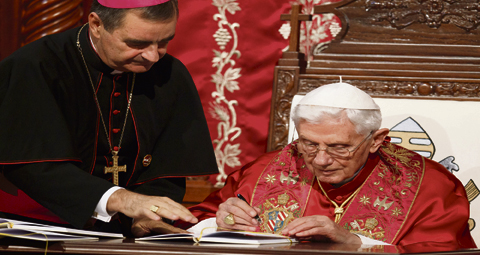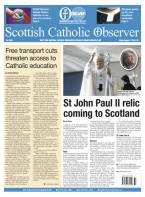September 21 | ![]() 0 COMMENTS
0 COMMENTS ![]() print
print

‘Religious freedom is the basic right on which many rights depend’
The Holy Father’s sage words that religious freedom is necessary for peace in the Middle East have come at a pivotal time for the region and also have resonance for Christians throughout the world. Pope Benedict XVI summed up how vital this freedom is when he said ‘religious freedom is the basic right on which many rights depend.’
During his three-day visit to Lebanon, the Pope called for Arab societies to ‘move beyond tolerance to religious freedom.’
During his visit, the Pope also signed a major document calling on Catholics in the Middle East to engage in dialogue with Orthodox, Jewish and Muslim neighbours and to affirm and defend their right to live freely in the region where Christianity was born.
He said Christians must do their part to end the ‘grim trail of death and destruction’ in the region, adding ‘I appeal to you all to be peacemakers.’
The Holy Father’s words were brought home to the Scottish faithful this week by Fr Samer Nassif, a Maronite priest from Lebanon, who works for the Catholic charity Aid to the Church in Need (ACN). At the ACN Challenges of Change event in St Mirin’s Cathedral, Paisley, yesterday, Fr Nassif said his country was a beacon of hope in a troubled region.
“In Lebanon, Christianity is still a flourishing religion: It is the only free Christianity in the Middle East,” he said. “After 40 years of Calvary, it is still standing triumphant. Lebanon is the only Arab country, which has a Christian and a Catholic President. Without Christians, Lebanon would not exist. Blessed Pope John Paul II said: Lebanon is more than a country, it is a message.”
He added that the Pope visited Lebanon to ‘give hope to the birth pangs’ pain of democracy for Arab peoples.
“Claiming freedom and human dignity, the peoples of the Middle East are fighting against dictatorship and theocracy,” Fr Nassif added.
And while believers in our democratic country do not live in daily fear for their lives, we do share solidarity with our Christian brothers and sisters in the Middle East in both their suffering and sacrifice. And make no mistake, while Christians in Scotland may not face overt persecution, the marginalisation of our values in this country is just as clear and present a danger.
Like Christians in the Middle East, we must protect our religious freedom and actively campaign against any political regime that attempts to infringe on or curtail our freedoms through legislation, policy of practice. It is a sad day when our freedoms are merely tolerated, or worse, removed.
The religious conflict in the Middle East may put our religious problems and differences here in Scotland into perspective, but it does not negate them.











